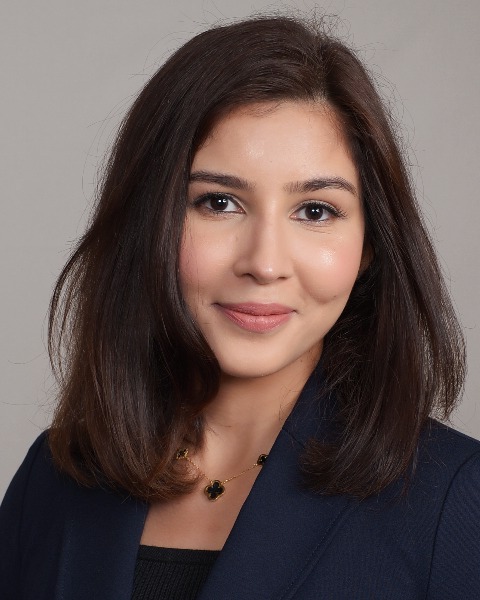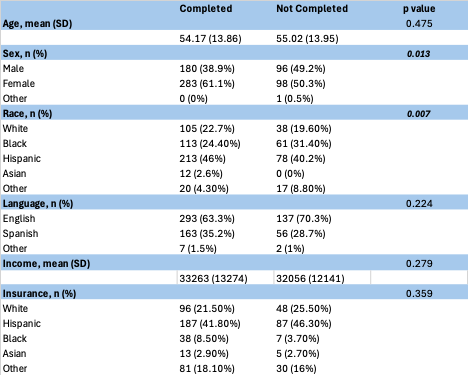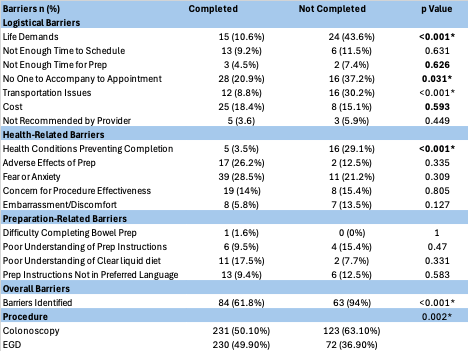Tuesday Poster Session
Category: Colorectal Cancer Prevention
P4756 - Barriers to Endoscopic Access: Associations Between Sociodemographics, Patient-Reported Challenges, and Procedure Completion at a Tertiary Care Hospital
Tuesday, October 28, 2025
10:30 AM - 4:00 PM PDT
Location: Exhibit Hall

Fariha Hasan, MD
Cooper University Hospital
Camden, NJ
Presenting Author(s)
Fariha Hasan, MD1, Ahmed Z. Shahzad, 2, Maryanna Schweininger, DO1, Alexis Sieber, MD, BA3, Houston R. Ward, BS4, Tanay-Veer Gandhi, BA5, Krystal Hunter, PhD, MBA1, Anthony Infantolino, MD6, Christina Tofani, MD, FACG2, Rachel Frank, MD7
1Cooper University Hospital, Camden, NJ; 2Cooper Medical School of Rowan University, Camden, NJ; 3Cooper Medical School of Rowan University, Philadelphia, PA; 4Cooper Medical School of Rowan University, Bound Brook, NJ; 5Cooper Medical School of Rowan University, Morganville, NJ; 6MD Anderson Cooper Digestive Health, Mt Laurel, NJ; 7Cooper University Hospital, Philadelphia, PA
Introduction: Timely access to colonoscopy and EGD is critical for gastrointestinal disease management and colorectal cancer prevention. Despite scheduling interventions disparities persist, particularly in underserved populations. While demographic predictors of access are well studied, patient-reported barriers remain underexplored. This study examines the relationships between sociodemographic characteristics, perceived barriers, and procedure completion.
Methods: We conducted a cohort study of 658 patients scheduled for colonoscopy or EGD at a tertiary care center, grouped by procedure completion status. Structured telephone surveys were administered to assess patient-reported barriers. This data was integrated with sociodemographic characteristics to identify factors associated with procedure completion.
Results: Completion rates were not significantly associated with age, language, insurance or median household income. Female patients were more likely to complete their procedures compared to males (61.1% vs. 38.9%, p = 0.013). White and Hispanic patients had higher completion rates (22.7% and 46.0%) compared to Black (24.4%) and Asian patients (2.6%) (p = 0.007). Colonoscopy was associated with lower completion rates compared to EGD (63.1% vs. 36.9%, p = 0.002). Call status was also associated with completion (p = 0.012), with English-speaking patients more likely to answer survey calls and complete their procedures compared to Spanish-speaking patients.
Patient-reported barriers were significantly associated with endoscopy non-completion (completion: 93.0% without barriers vs. 61.8% with barriers, p < 0.001). Health-related barriers had the strongest impact, with only 3.5% completing their procedure (p < 0.001). Life demands and scheduling conflicts also reduced completion (10.6% vs. 89.4%, p < 0.001), as did transportation challenges (8.8% vs. 91.2%, p < 0.001). Patients who reported not having someone to accompany them to the appointment were also less likely to complete the procedure (62.8% vs. 79.1%, p = 0.031). Time-related scheduling barriers were more frequently reported by colonoscopy patients than those undergoing EGD (p = 0.044).
Discussion: Patient-reported barriers were strongly associated with procedure non-completion. Additional factors such as sex, race and language also influenced outcomes. These findings highlight the need for targeted, patient-centered interventions to address social and logistical barriers and promote equitable access to endoscopic care.

Figure: Table 1: Demographics between the procedure completion and non-completion group

Figure: Table 2: Outcomes and barriers between the procedure completion and non-completion group
Disclosures:
Fariha Hasan indicated no relevant financial relationships.
Ahmed Shahzad indicated no relevant financial relationships.
Maryanna Schweininger indicated no relevant financial relationships.
Alexis Sieber indicated no relevant financial relationships.
Houston Ward: McKesson Corp. – Stock-publicly held company(excluding mutual/index funds).
Tanay-Veer Gandhi indicated no relevant financial relationships.
Krystal Hunter indicated no relevant financial relationships.
Anthony Infantolino indicated no relevant financial relationships.
Christina Tofani indicated no relevant financial relationships.
Rachel Frank indicated no relevant financial relationships.
Fariha Hasan, MD1, Ahmed Z. Shahzad, 2, Maryanna Schweininger, DO1, Alexis Sieber, MD, BA3, Houston R. Ward, BS4, Tanay-Veer Gandhi, BA5, Krystal Hunter, PhD, MBA1, Anthony Infantolino, MD6, Christina Tofani, MD, FACG2, Rachel Frank, MD7. P4756 - Barriers to Endoscopic Access: Associations Between Sociodemographics, Patient-Reported Challenges, and Procedure Completion at a Tertiary Care Hospital, ACG 2025 Annual Scientific Meeting Abstracts. Phoenix, AZ: American College of Gastroenterology.
1Cooper University Hospital, Camden, NJ; 2Cooper Medical School of Rowan University, Camden, NJ; 3Cooper Medical School of Rowan University, Philadelphia, PA; 4Cooper Medical School of Rowan University, Bound Brook, NJ; 5Cooper Medical School of Rowan University, Morganville, NJ; 6MD Anderson Cooper Digestive Health, Mt Laurel, NJ; 7Cooper University Hospital, Philadelphia, PA
Introduction: Timely access to colonoscopy and EGD is critical for gastrointestinal disease management and colorectal cancer prevention. Despite scheduling interventions disparities persist, particularly in underserved populations. While demographic predictors of access are well studied, patient-reported barriers remain underexplored. This study examines the relationships between sociodemographic characteristics, perceived barriers, and procedure completion.
Methods: We conducted a cohort study of 658 patients scheduled for colonoscopy or EGD at a tertiary care center, grouped by procedure completion status. Structured telephone surveys were administered to assess patient-reported barriers. This data was integrated with sociodemographic characteristics to identify factors associated with procedure completion.
Results: Completion rates were not significantly associated with age, language, insurance or median household income. Female patients were more likely to complete their procedures compared to males (61.1% vs. 38.9%, p = 0.013). White and Hispanic patients had higher completion rates (22.7% and 46.0%) compared to Black (24.4%) and Asian patients (2.6%) (p = 0.007). Colonoscopy was associated with lower completion rates compared to EGD (63.1% vs. 36.9%, p = 0.002). Call status was also associated with completion (p = 0.012), with English-speaking patients more likely to answer survey calls and complete their procedures compared to Spanish-speaking patients.
Patient-reported barriers were significantly associated with endoscopy non-completion (completion: 93.0% without barriers vs. 61.8% with barriers, p < 0.001). Health-related barriers had the strongest impact, with only 3.5% completing their procedure (p < 0.001). Life demands and scheduling conflicts also reduced completion (10.6% vs. 89.4%, p < 0.001), as did transportation challenges (8.8% vs. 91.2%, p < 0.001). Patients who reported not having someone to accompany them to the appointment were also less likely to complete the procedure (62.8% vs. 79.1%, p = 0.031). Time-related scheduling barriers were more frequently reported by colonoscopy patients than those undergoing EGD (p = 0.044).
Discussion: Patient-reported barriers were strongly associated with procedure non-completion. Additional factors such as sex, race and language also influenced outcomes. These findings highlight the need for targeted, patient-centered interventions to address social and logistical barriers and promote equitable access to endoscopic care.

Figure: Table 1: Demographics between the procedure completion and non-completion group

Figure: Table 2: Outcomes and barriers between the procedure completion and non-completion group
Disclosures:
Fariha Hasan indicated no relevant financial relationships.
Ahmed Shahzad indicated no relevant financial relationships.
Maryanna Schweininger indicated no relevant financial relationships.
Alexis Sieber indicated no relevant financial relationships.
Houston Ward: McKesson Corp. – Stock-publicly held company(excluding mutual/index funds).
Tanay-Veer Gandhi indicated no relevant financial relationships.
Krystal Hunter indicated no relevant financial relationships.
Anthony Infantolino indicated no relevant financial relationships.
Christina Tofani indicated no relevant financial relationships.
Rachel Frank indicated no relevant financial relationships.
Fariha Hasan, MD1, Ahmed Z. Shahzad, 2, Maryanna Schweininger, DO1, Alexis Sieber, MD, BA3, Houston R. Ward, BS4, Tanay-Veer Gandhi, BA5, Krystal Hunter, PhD, MBA1, Anthony Infantolino, MD6, Christina Tofani, MD, FACG2, Rachel Frank, MD7. P4756 - Barriers to Endoscopic Access: Associations Between Sociodemographics, Patient-Reported Challenges, and Procedure Completion at a Tertiary Care Hospital, ACG 2025 Annual Scientific Meeting Abstracts. Phoenix, AZ: American College of Gastroenterology.
